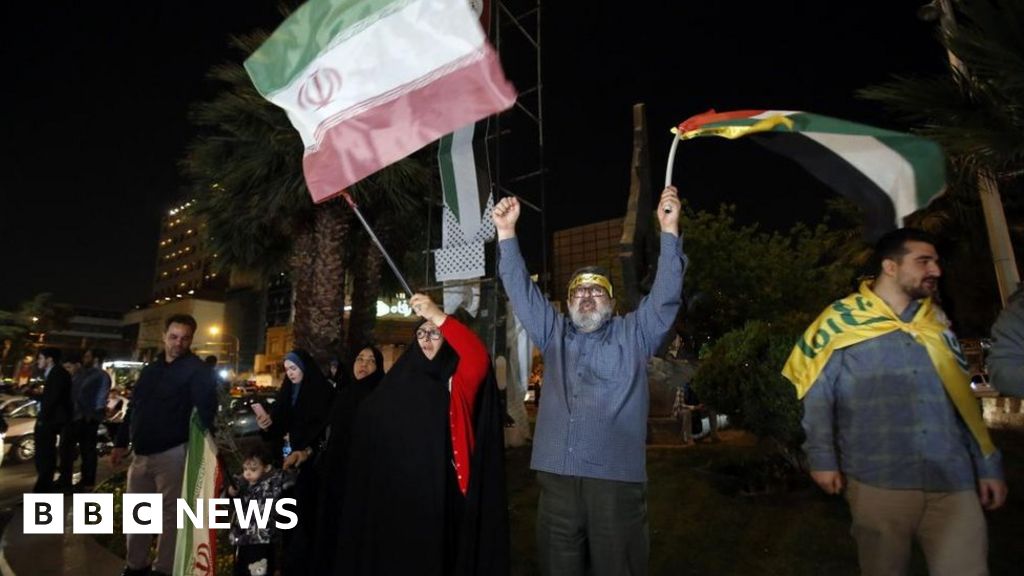Iran has launched dozens of aerial drones and missiles at Israel, marking a widely anticipated reprisal attack.
Iran’s Islamic Revolution Guard Corps (IRGC) said the attack was aimed at “specific targets”.
The Israeli military said Israel and other countries had intercepted dozens of cruise missiles and drones, mostly outside Israeli airspace.
Israel’s prime minister called a war cabinet meeting after the start of the Iranian attack.
It represents the first time hostilities between the two arch-foes, who have been engaged in a years-long shadow war, have spilt into open confrontation.
Iran had vowed to retaliate for a strike on its consulate in Syria on 1 April which killed seven IRGC officers, including a top commander. It accused Israel of carrying out that attack, but Israel neither confirmed nor denied it.
“Tonight’s wide-scale attack by Iran is a major escalation,” said Israel Defense Forces (IDF) spokesman Rear Admiral Daniel Hagari.
“Together with our allies and partners, we are operating at full force to defend the State of Israel and the people of Israel.”
He said Iran had launched “a massive swarm of over 200 killer drones, cruise missiles and ballistic missiles”, adding that Israel and its “partners across the region” had intercepted the vast majority of them.
He said some missiles had hit inside Israel, causing minor damage to a military base but no casualties.
Israel’s ambulance service said a seven-year-old Bedouin girl had been injured by shrapnel from falling debris in the southern Arad region.
Two US officials told CBS, the BBC’s US partner, that American forces had shot down several drones, but did not specify where or how they were intercepted.
The UK Ministry of Defence said RAF jets had been deployed in Iraq and Syria to intercept “any airborne attacks within range of our existing missions”.
Sirens sounded across Israel and loud explosions were heard over Jerusalem, with air defence systems shooting down objects over the city.
Israel, Lebanon and Iraq closed their airspaces, and Syria and Jordan put their air defences on alert.
Iran’s IRGC – the most powerful branch of its armed forces – said it had launched the attack “in retaliation against the Zionist regime’s [Israel] repeated crimes, including the attack on the Iranian embassy’s consulate in Damascus”.
Shortly before news of Iran’s launches, Israeli Prime Minister Benjamin Netanyahu said his country’s “defensive systems” were deployed.
“We are ready for any scenario, both defensively and offensively. The State of Israel is strong. The IDF is strong. The public is strong.
“We appreciate the US standing alongside Israel, as well as the support of Britain, France and many other countries.”
US President Joe Biden cut short a trip to Delaware to return to the White House as tensions mounted on Saturday.
“Our commitment to Israel’s security against threats from Iran and its proxies is ironclad,” he said, following a meeting with his national security team after Iran’s attack began.
UK Prime Minister Rishi Sunak condemned Iran’s “reckless” attack, vowing that the UK would “continue to stand up for Israel’s security and that of all our regional partners”.
UN Secretary General António Guterres issued a statement saying he “strongly condemn[ed] the serious escalation represented by the large-scale attack launched on Israel” by Iran.
He said he was calling for “an immediate cessation of these hostilities” and for all sides to exercise maximum restraint.
“Neither the region nor the world can afford another war,” he warned.
Earlier this week, Israel’s defence and foreign ministers warned that if Iran attacked Israel, Israel would strike back inside Iran.

Emily Foster is a globe-trotting journalist based in the UK. Her articles offer readers a global perspective on international events, exploring complex geopolitical issues and providing a nuanced view of the world’s most pressing challenges.








